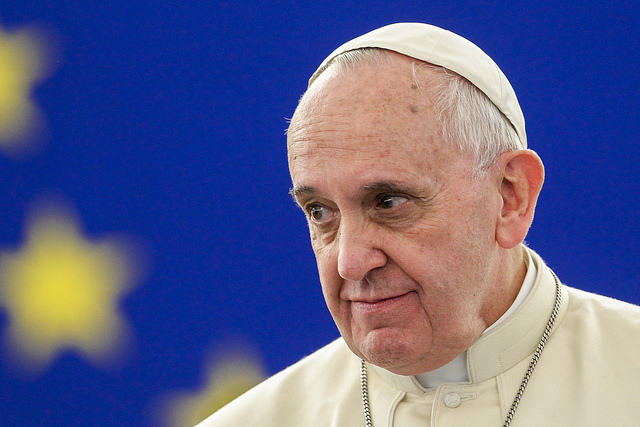Where did the justification for war come from? Early versions appeared in India and the Roman Empire. In Christianity the seeds were sown by Saint Augustine and reaped by Thomas Aquinas. Today, Just War Theory, as espoused by the Catholic Church, holds:
- the damage inflicted by the aggressor on the nation or community of nations must be lasting, grave, and certain;
- all other means of putting an end to it must have been shown to be impractical or ineffective;
- there must be serious prospects of success;
- the use of arms must not produce evils and disorders graver than the evil to be eliminated (the power of modern means of destruction weighs very heavily in evaluating this condition).
But the Vatican just held a conference titled “Nonviolence and Just Peace: Contributing to the Catholic Understanding of and Commitment to Nonviolence.” At Political Violence at a Glance, Erica Chenoweth writes of the conference:
In their concluding appeal to Pope Francis, the 80 conference participants recommended that he reject just war doctrine as a viable or productive Catholic tradition. They also recommended that he write a new encyclical laying out the Catholic Church’s commitment to nonviolence in all of its manifestations—including nonviolent action as a means of engaging in conflict, nonviolent conflict resolution as a way of resolving conflict, and nonviolence as the principle doctrine of the Catholic Church.
Just War, Ms. Chenoweth explains, “has had a monopolistic influence on the way people in the West think about war and violence—whether they know it or not.”
Consequently, many people now take for granted concepts like the right to self-defense, the importance of weighing the goals of war against its potential human costs, the need to exhaust other options before going to war, and the necessity of only fighting wars you think you can win.
In the National Catholic Reporter, Terrence Rynne provides the reasons why Just War Theory might be amended.
- Modern wars have made the just war theory obsolete;
- The rise of a Christology “from below”;
- A clearer understanding of how the New Testament relates to contemporary problems;
- A renewed appreciation of the way the early church practiced Jesus’ teachings on peace;
- The compelling, thrilling saga of nonviolent action over the 60 years since Gandhi.
At Common Dreams, Mairead Corrigan Maguire, Nobel Peace Prize winner for her work in Northern Ireland, writes:
The Appeal is now in the hands of Pope Francis. We can all now pray, fast and work for a new encyclical on nonviolence and nonkilling. We hope that Pope Francis will continue to show courage, be brave and bold, and be a true Prophet, a loving Shepherd and a bright light in these dark days for the human family. Together, we can herald the coming of a more nonviolent world.
It has the potential to surpass in influence even his environmental encyclical, Laudato Si´.

